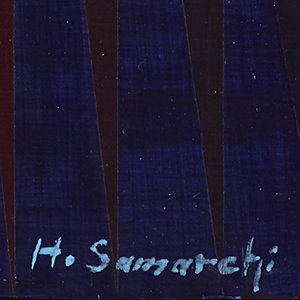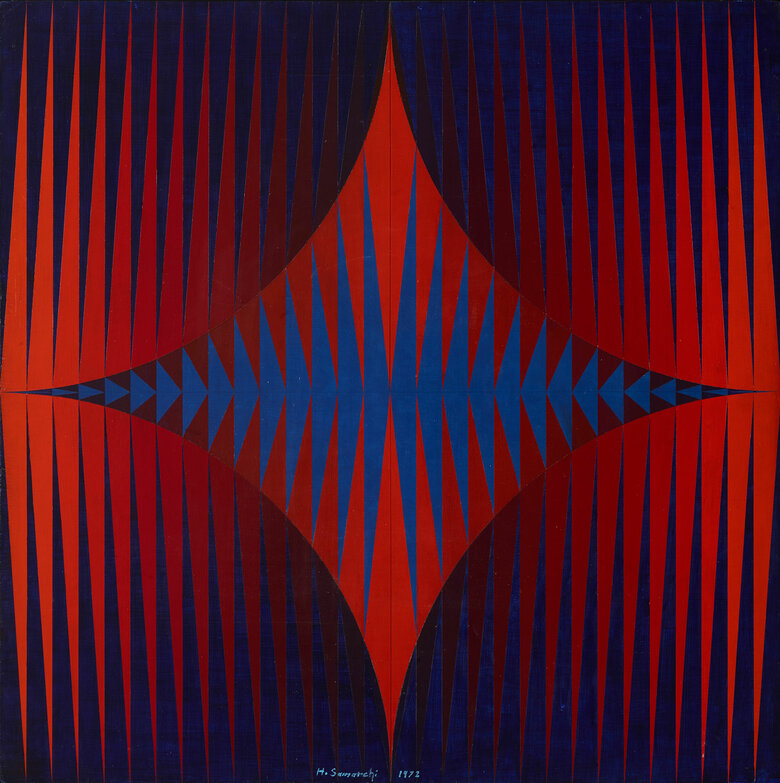Born in Mosul in 1939, Hashim Samarchi was to become one of the most prominent optical and graphic artists of his generation in Iraq. Leaving the northern Iraqi city for the capital, Baghdad,...


HASHIM SAMARCHI, Iraq (1939)
Bio
Written by MYSA KAFIL-HUSSAIN
Born in Mosul in 1939, Hashim Samarchi was to become one of the most prominent optical and graphic artists of his generation in Iraq. Leaving the northern Iraqi city for the capital, Baghdad, Samarchi enrolled into the Institute of Fine Arts, graduating in the late 1950s, after which he became a teacher in local schools for several years. Wanting to learn more and develop his work further, Samarchi left his teaching post, joined the Academy of Fine Arts, and graduated in 1966, immediately going into another teaching role in Saudi Arabia for one year after his graduation.[1]
The mid-1960s were a pivotal time for Samarchi and his career. Showing serious promise and a unique graphic, abstract style unlike many other Iraqi artists or artist groups, Samarchi’s talents were beginning to be noticed. In 1967, he took part in the Carreras Craven “A” exhibition, which was the first time a large show by Arab artists toured Europe. Exhibiting numerous paintings in London, Rome and Paris, amongst many other Arab cities, the exhibition was ground-breaking for the artists involved, and especially for Samarchi, who won first prize as ‘Best Iraqi Painter’, with the chairman of the exhibition awards committee commenting that Samarchi’s work was “one of the best paintings in the exhibition….a pure 20th Century image”.[2] Already feeling that his career and his artistic development was heading in the right direction, Samarchi was then nominated alongside fellow artists Rafa al-Nasiri and Salim al-Dabbagh by the Iraqi Artists Association for a Calouste Gulbenkian Foundation fellowship in Lisbon, Portugal.[3]
“The work I carried out in a first phase consisted merely of impressions, fantasies and compositions inspired from nature or imagination. After that, I started studying the dot and the configurations it leaves behind during its path and movement. The dot therefore becomes the line, and the line in its turn becomes the shape, and repetition of shape becomes the subject matter of the artwork and the impact these shapes have on the personal vision; the same goes for colour, its gradation and combination with other colours, since a different combination of colours produces a different impression on the viewer. From this point of view, graphic art is different from hand drawing with a brush.” [4] Hashim Samarchi on his artistic development during his time in Portugal, 2018
The fellowship focused on graphic art, and for two years the artists worked incredibly hard to develop their own personal styles and perfect their technical skills, as well as interact with local artists and exhibit their work. This period had a great impact on Samarchi, pushing him to look at his old work with new eyes and advance his later compositions into new levels of abstraction.
Returning to Iraq in 1969, darkness had come over the region following the 1967 Six Day War, in which the Arabs suffered a crushing defeat by Israel. Although many felt broken, the spirit of Arab nationalism still remained, especially for many artists and intellectuals. Alongside Dia al-Azzawi, Ismail Fattah, Muhammed Muhraddin, Saleh al-Jumaie and Rafa al-Nasiri, Samarchi founded the New Vision Group, hoping to start a revolutionary movement bringing together art and politics and with a focus on graphic art, and especially producing posters. The group’s manifesto, written by Azzawi, stated, “We reject the artist of partitions and boundaries. We advance. We fall. But we will not retreat.”[5] As a result, posters became an important part of artistic production in the late 1960s and 1970s, with poster exhibitions in the National Museum of Modern Art in 1971, the al-Marbad Poetry Festival in Basra, also in 1971, the Al-Wasiti Festival in 1972 and many other exhibitions throughout the 1970s.[6]
Although Samarchi’s posters and occasional illustrations (he illustrated at least two poetry books in the early 1970s)[7] took up much of his time, he still worked hard on his large abstract artworks, and in 1972 created ‘Takween’ (found in the DAF Collection), a visual masterpiece blending geometrical forms, lines, shapes and colours to create a mesmerising, multi-layered optical illusion. Inspired by not only graphic abstraction and optical art, Samarchi was also influenced by the intricacies and calligraphic repetitions found in the Hurifiyya movement and the manuscripts, which inspired it, an impact visible in his linear, delicate artworks and his poster designs.
In the mid-1970s, Samarchi worked within the Ministry of Information, focusing specifically on a new magazine entitled Afaq Arabiya,[8] an important political and cultural publication run by Shafiq al-Kamali, a prominent figure in Iraq who would later write the national anthem. With the political situation changing dramatically in the late 1970s, Samarchi – like many other Iraqis - looked for opportunities abroad. In 1981, he moved to London, and worked in the studio of Dia al-Azzawi for almost a decade. Samarchi then retired and focused on enjoying life with his family, but his legacy as one of Iraq’s most influential and ground-breaking graphic artists remains, with artworks full of effects, illusions and abstractions which have stood the test of time.
Notes
[1] Calouste Gulbenkian Museum: “Hashim Samarchi”: https://gulbenkian.pt/museu/en/artist/hashim-samarchi-2
[2] Grosvenor Art Gallery: Modern Arab Masters, 27 September – 12 October 2012, London (press release): https://www.grosvenorgallery.com/exhibitions/39/press_release_text
[3] Calouste Gulbenkian Museum: “Hashim Samarchi”
[4] Ibid
[5] Dia al-Azzawi, Ismail Fattah, Salih al-Jumaie, Muhammed Muhraddin, Rafa al-Nasiri, Hashem Samarji, 2018. “Manifesto: Towards a New Vision”, In Modern Art in the Arab World - Primary Documents: Pages 306-309
[6] Dia al-Azzawi, 2018. “Graphic Design and the Visual Arts in Iraq”, In Modern Art in the Arab World - Primary Documents: Pages 370-371
[7] British Library Catalogue: “Dīwān ʻAbd al-Wahhāb al-Bayātī”, illustrated by Yayha al-Shaykh, Nuri al-Rawi & Hashim Samarji. http://explore.bl.uk/primo_library/libweb/action/dlDisplay.do?vid=BLVU1&search_scope=LSCOP-ALL&docId=BLL01013229184&fn=permalink
[8] "فنان من بلادي: هاشم سمرجي", In Bakdida.ca, 2008: www.bakhdida.ca/BassimHannaPetros/HashimSamarchi.htm
Sources
Al-Azzawi, Dia. “Graphic Design and the Visual Arts in Iraq”. In Lenssen,Anneka; Rogers, Sarah; Shabout, Nada, Modern Art in the Arab World - Primary Documents. North Carolina: Duke University Press, 2018: Pages 370-371
Al-Azzawi, Dia; Fattah, Ismail; al-Jumaie, Saleh; Muhraddin, Muhammad; al-Nasiri, Rafa; Samarji, Hashem. “Manifesto: Towards a New Vision”. In Lenssen,Anneka; Rogers, Sarah; Shabout, Nada, Modern Art in the Arab World - Primary Documents. North Carolina: Duke University Press, 2018: Pages 306-309
Mejcher-Atassi, Sonja. Unfolding Narratives from Iraq: Rafa Nasiri’s Book Art. Skira, 2017
Rafa Nasiri – Salem Dabbagh – Hashim Samarchi: Exhibition of Paintings, Galeria Gravura, Lisbon, Portugal, 1968 (exhibition catalogue). 1968.
Hashim Samarchi – Baghdad, 1969 (exhibition catalogue). 1969. “Modern Art Iraq Archive”, Iraqart.org. Accessed April 2020. https://artiraq.org/maia/items/show/150
Four Iraqi Artists, National Museum of Modern Art, Baghdad, 1971-1972 (exhibition catalogue). 1971. “Modern Art Iraq Archive”, Iraqart.org. Accessed April 2020. https://artiraq.org/maia/items/show/47
. Bakhdida.ca. 2008. Accessed April 8, 2020. "فنان من بلادي: هاشم سمرجي"
www.bakhdida.ca/BassimHannaPetros/HashimSamarchi.htm
Calouste Gulbenkian Museum: “Hashim Samarchi”. Accessed April 2020. https://gulbenkian.pt/museu/en/artist/hashim-samarchi-2
Grosvenor Art Gallery: Modern Arab Masters, 27 September – 12 October 2012, London (press release). Accessed April 2020. https://www.grosvenorgallery.com/exhibitions/39/press_release_text
British Library Catalogue: “Dīwān ʻAbd al-Wahhāb al-Bayātī”, illustrated by Yayha al-Shaykh, Nuri al-Rawi & Hashim Samarji. Accessed May 2020. http://explore.bl.uk/primo_library/libweb/action/dlDisplay.do?vid=BLVU1&search_scope=LSCOP-ALL&docId=BLL01013229184&fn=permalink
CV
Solo Exhibitions
2023
Hashim Samarchi at Abu Dhabi Art, Grosvenor Gallery, Abu Dhabi Art, United Arab emirates
1969
Exhibition of Graphic Art, Baghdad, Iraq
Exhibition of Graphic Art,
Baghdad, Iraq; Beirut, Lebanon
1968
Exhibition of Paintings, Lisbon, Portugal
Exhibition of Graphic Art,
Lisbon, Portugal
Group Exhibitions
2023
Beirut And The Golden Sixties: A Manifesto Of Fragility, Mathaf, Arab Museum of Modern Art, Doha, Qatar
2022
Manifesto of Fragility: Beirut and The Golden Sixties, Lyon Museum of Contemporary Art, Lyon, France
2019
Art and Architecture between Lisbon and Baghdad: The Calouste Gulbenkian Foundation in Iraq, 1957-1973, Calouste Gulbenkian Museum, Lisbon, Portugal
2017
Arab Print: Volume III, Meem Gallery, Dubai, United Arab Emirates
2014
A Tribute to Rafa Nasiri, Nabad Art Gallery, Amman, Jordan
2012
Modern Arab Masters, Grosvenor Gallery, London, UK
1979
Exhibition of Iraqi Posters, National Museum of Modern Art, Baghdad, Iraq
1978
Seven Iraqi Artists (Group exhibition with Dia al-Azzawi, Saleh Al-Jumaie, Nadhim Ramzi, Tareq Ibrahim, Maki Hussein Maki & Rafa al-Nasiri), Iraqi Cultural Centre, London, UK
1977
Six Iraqi Artists (Group exhibition with Dia al-Azzawi, Rafa al-Nasiri, Tareq Ibrahim, Maki Hussein Maki & Nadhim Ramzi), National Museum of Modern Art, Baghdad, Iraq
1972
4th International Biennial of the Poster, Warsaw, Poland
Al-Wasiti Festival, Baghdad, Iraq
1971
Exhibition of Plastic Arts: Al-Marbad Poetry Festival, Basra, Iraq
Iraqi Art Exhibition, Kuwait
Four Iraqi Artists: al-Nasiri - al-Jumaie - al-Azzawi - Samarchi, National Museum of Modern Art, Baghdad, Iraq
1970
Exhibition of Graphic Art, Kuwait
Exhibition of Iraqi Posters, Baghdad, Iraq
1969
First International Biennale, Liege, Belgium
1968
Exhibition of Paintings (Group exhibition with Rafa al-Nasiri & Salem al-Dabbagh), Galeria Gravura, Lisbon, Portugal
1967
Arabic Art Exhibition (Careras Craven), Cairo, Egypt; Beirut, Lebanon; Damascus, Syria; Amman, Jordan; Baghdad, Iraq; Kuwait; Bahrain; London, United Kingdom
Intergrafik Exhibition, Berlin, Germany
1966
Iraqi Graphic Art Exhibition, Berlin
Iraqi Artists Society Annual Exhibition & Inauguration of the New Centre, National Museum of Modern Art, Baghdad, Iraq
1965
Iraqi Artists Society – Eighth Annual Exhibition, National Museum of Modern Art, Baghdad, Iraq
International Book Art Exhibition, Leipzig, Germany
Awards and Honors
1967
First Prize - Best Iraqi Painter, Arabic Art Exhibition (Carreras Craven “A”), Cairo, Egypt; Beirut, Lebanon; Damascus, Syria; Amman, Jordan; Baghdad, Iraq; Kuwait; Bahrain; London, United Kingdom
Affiliations & Memberships
1969
Co-Founding Member, New Vision group
1967
Arts Fellowship at the Gulbenkian Foundation, Lisbon, Portugal (until 1969)
1960s
Member of the Iraqi Artists Society
Collections
Azzawi Collection, London, United Kingdom
Calouste Gulbenkian Museum, Lisbon, Portugal
Hussain Ali Harba Family Collection, Amman, Jordan
Ibrahimi Collection, Amman, Jordan
Ramzi & Saeda Dalloul Art Foundation (DAF), Beirut, Lebanon
Press
سعورس _ رافع الناصري _ فن الغرافيك.pdf
طباعة - عتبات التشكيل.pdf
انطلقت من كتابها «الفن الحديث في العراق»… «مي مظفر» تقدم تحولات الفن العراقي في الدارة الأردنية – مجلة الامة العربية.pdf
Nizwa_2014.pdf
هاشم سمرجي.pdf
ArtsGulf.pdf
HASHIM SAMARCHI Artwork
Become a Member
Join us in our endless discovery of modern and contemporary Arab art
Become a Member
Get updates from DAF
Follow Artists
Save your favourite Artworks
Share your perspectives on Artworks
Be part of our community
It's Free!
We value your privacy
TermsCookiesPrivacy Policies
Become a Member
Get updates from DAF
Follow Artists
Save your favourite Artworks
Share your perspectives on Artworks
Be part of our community
It's Free!
We value your privacy
TermsCookiesPrivacy Policies
Become a Member
Get updates from DAF
Follow Artists
Save your favourite Artworks
Share your perspectives on Artworks
Be part of our community
It's Free!
We value your privacy
TermsCookiesPrivacy Policies
Welcome to the Dalloul Art Foundation
Thank you for joining our community
If you have entered your email to become a member of the Dalloul Art Foundation, please click the button below to confirm your email and agree to our Terms, Cookie & Privacy policies.
We value your privacy, see how
Become a Member
Get updates from DAF
Follow Artists
Save your favourite Artworks
Share your perspectives on Artworks
Be part of our community
It's Free!
We value your privacy
TermsCookiesPrivacy Policies

-HashimSamarchi-Front.jpg)
-HashimSamarchi-Front.jpg)



